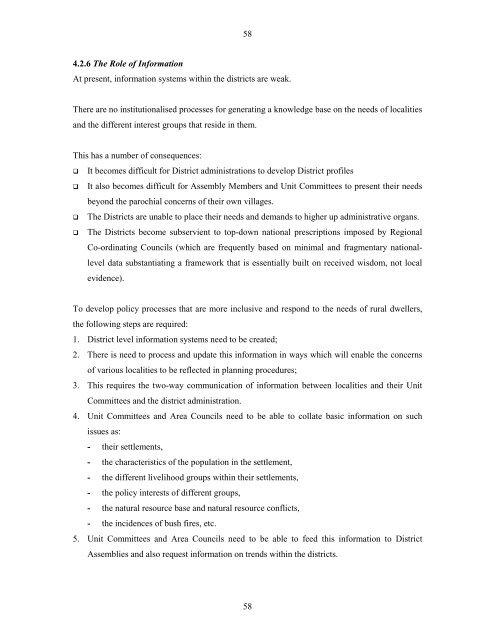Poverty Dimensions of Public Governance and Forest Management ...
Poverty Dimensions of Public Governance and Forest Management ...
Poverty Dimensions of Public Governance and Forest Management ...
You also want an ePaper? Increase the reach of your titles
YUMPU automatically turns print PDFs into web optimized ePapers that Google loves.
58<br />
4.2.6 The Role <strong>of</strong> Information<br />
At present, information systems within the districts are weak.<br />
There are no institutionalised processes for generating a knowledge base on the needs <strong>of</strong> localities<br />
<strong>and</strong> the different interest groups that reside in them.<br />
This has a number <strong>of</strong> consequences:<br />
" It becomes difficult for District administrations to develop District pr<strong>of</strong>iles<br />
" It also becomes difficult for Assembly Members <strong>and</strong> Unit Committees to present their needs<br />
beyond the parochial concerns <strong>of</strong> their own villages.<br />
" The Districts are unable to place their needs <strong>and</strong> dem<strong>and</strong>s to higher up administrative organs.<br />
" The Districts become subservient to top-down national prescriptions imposed by Regional<br />
Co-ordinating Councils (which are frequently based on minimal <strong>and</strong> fragmentary nationallevel<br />
data substantiating a framework that is essentially built on received wisdom, not local<br />
evidence).<br />
To develop policy processes that are more inclusive <strong>and</strong> respond to the needs <strong>of</strong> rural dwellers,<br />
the following steps are required:<br />
1. District level information systems need to be created;<br />
2. There is need to process <strong>and</strong> update this information in ways which will enable the concerns<br />
<strong>of</strong> various localities to be reflected in planning procedures;<br />
3. This requires the two-way communication <strong>of</strong> information between localities <strong>and</strong> their Unit<br />
Committees <strong>and</strong> the district administration.<br />
4. Unit Committees <strong>and</strong> Area Councils need to be able to collate basic information on such<br />
issues as:<br />
- their settlements,<br />
- the characteristics <strong>of</strong> the population in the settlement,<br />
- the different livelihood groups within their settlements,<br />
- the policy interests <strong>of</strong> different groups,<br />
- the natural resource base <strong>and</strong> natural resource conflicts,<br />
- the incidences <strong>of</strong> bush fires, etc.<br />
5. Unit Committees <strong>and</strong> Area Councils need to be able to feed this information to District<br />
Assemblies <strong>and</strong> also request information on trends within the districts.<br />
58
















